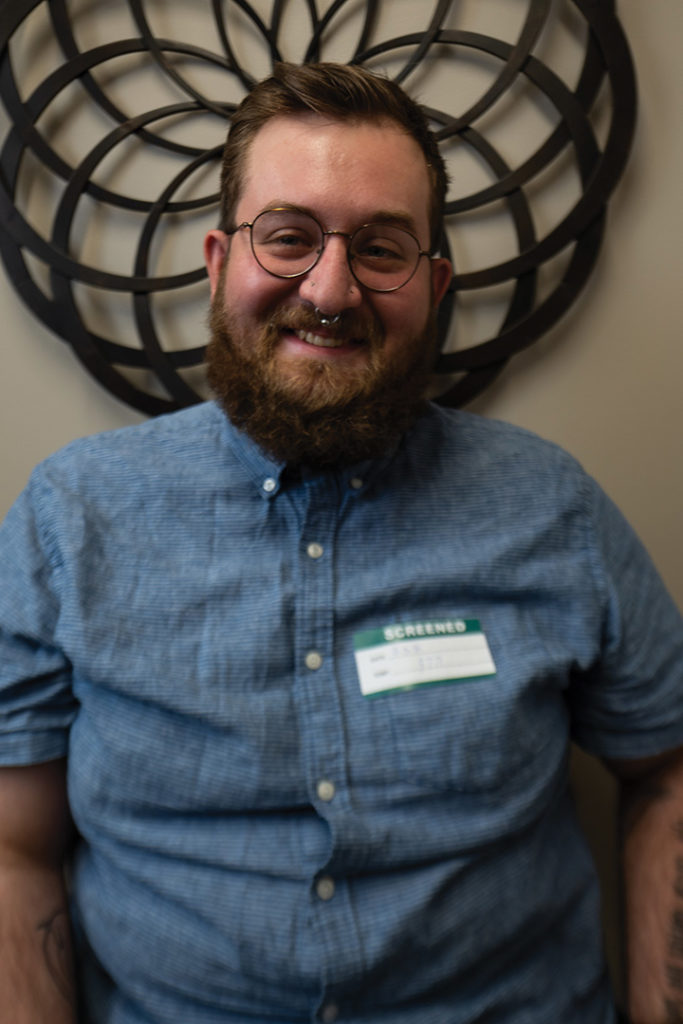Casey ’21 has a reason to smile again, thanks to dental services available to Berea College students. He had known about the student dental clinic at the nearby hospital for some time but didn’t visit until the summer before his senior year. He had been putting it off because he viewed dental care as a luxury, and he had not quite comprehended that his much-needed dental work would be available at no cost to him.
The Burkesville, Ky.-native, like all Berea College students, comes from a low-income background. His parents separated when he was young, and dental care was just not an option for the family. In addition to the financial restrictions his family faced, his dad, who was his primary caregiver, has been disabled since before Casey was born, so even getting transportation to a dentist appointment was difficult. In fact there was very little transportation in his life growing up beyond riding the school bus or going to the grocery store with his grandmother.
“There are a lot of kids who are like me,” Casey said. “They come from impoverished backgrounds—there are things that just take a back seat. As long as you’re not bleeding and nothing’s broken, you don’t really go to a doctor.”
Even when he became an adult, Casey still saw dental care as an extravagance because it typically is so expensive. “I guess my next-best plan,” he explained, “was to wait until I found gainful employment that maybe offered some gracious dental benefits or, you know, try to raise my credit score and be able to put it on a credit card and pay it off.”
By the time he took advantage of the services at White House Clinics, there was quite a bit of work he needed to have done. “There were circumstances from my childhood that led me to have bad teeth,” he says.
They provided routine cleanings, filled cavities and performed a root canal. “Anything that was medically necessary was completely covered,” Casey said. But there was a bigger, cosmetic issue for Casey. He was missing a tooth.
“In between my front tooth and my canine,” Casey said, “the secondary tooth [incisor] was practically gone. It started out with cavities. Then I hit myself with something while I was working in the garden, and I ended up breaking that tooth off, and I just couldn’t afford to fix it. I was missing one of my front teeth, and as someone who comes from Appalachia, there are a lot of negative stereotypes whenever people are missing their teeth. I didn’t smile as much. Whenever I would laugh or yawn in public, I would cover my mouth with my hand.”
Replacing that tooth and the other work done resulted in improvements to Casey’s external appearance, but it precipitated internal changes for him, too.
“In high school, I used to be way prouder of my smile and all the photos taken of me,” he said. “Having my teeth fixed, I’m smiling more, because aside from, you know, cavities and other problems like that, I have pretty straight teeth. It’s helped me regain some of that confidence that I had in my smile.
“To some, a couple hundred or a couple thousand dollars’ worth of dental work might not seem like a significant impact on someone’s life, but just speaking for myself, my confidence is better. I feel like whenever I go out into the professional world, and I’m representing not only myself but also Berea College, it gives me an opportunity to reflect the region and the school and the work of the donors better.”
Casey ’21
“There’s something more professional and presentable about having a full set of teeth,” he continued. “And maybe they’re not pearly white, but they’re still clean and straight. And, I can speak with more confidence whenever I’m talking.”
Casey says in his time at Berea College, he has grown a lot as a person, and one of the things he is most proud of about his time here is taking better care of himself.
“I think the more resources we have for students to start caring about their own wellbeing, the more likely they’re going to use them, and the more growth they’re going to experience while they’re here.”
Casey encourages donors to come and meet students like him, people who take advantage of and use the resources that are available in part through donations to the College.
“To some, a couple hundred or a couple thousand dollars’ worth of dental work might not seem like a significant impact on someone’s life, but just speaking for myself, my confidence is better,” he said. “I feel like whenever I go out into the professional world, and I’m representing not only myself but also Berea College, it gives me an opportunity to reflect the region and the school and the work of the donors better.” •


